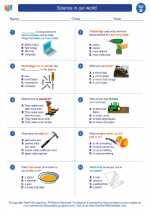What is Chronology?
Chronology is the science of arranging events in the order of their occurrence in time. It involves the study of historical records and artifacts to establish the timeline of events.
Importance of Chronology
Understanding chronology is crucial for making sense of historical events, tracking the evolution of life on Earth, and comprehending the development of human societies and cultures.
Methods of Establishing Chronology
There are several methods used to establish chronology, including:
- Carbon dating: This method is used to determine the age of organic materials based on the decay of radioactive carbon isotopes.
- Stratigraphy: This involves studying the layers of rock and soil to determine the relative ages of different geological formations and archaeological artifacts.
- Written records: Historical documents, inscriptions, and texts provide valuable information for establishing chronology.
- Dendrochronology: The study of tree rings to determine the age of trees and wooden artifacts.
Applications of Chronology
Chronology is applied in various fields, including:
- History: Chronological order is essential for understanding historical events and their impacts.
- Geology: Chronology helps in understanding the Earth's geological history and the evolution of landscapes.
- Archaeology: Establishing the chronology of artifacts and structures is crucial for reconstructing past civilizations.
- Biology: Chronology is used to study the evolution of life forms and the development of ecosystems over time.
Conclusion
Chronology is a foundational concept in the study of history, geology, archaeology, and biology. By understanding the methods of establishing chronology and its applications, we can gain valuable insights into the timeline of events that have shaped our world.
.◂Science Worksheets and Study Guides Second Grade. Science in our world
Study Guide Science in our world
Science in our world  Worksheet/Answer key
Worksheet/Answer key Science in our world
Science in our world  Worksheet/Answer key
Worksheet/Answer key Science in our world
Science in our world  Worksheet/Answer key
Worksheet/Answer key Science in our world
Science in our world  Vocabulary/Answer key
Vocabulary/Answer key Science in our world
Science in our world 

 Worksheet/Answer key
Worksheet/Answer key
 Worksheet/Answer key
Worksheet/Answer key
 Worksheet/Answer key
Worksheet/Answer key
 Vocabulary/Answer key
Vocabulary/Answer key

The resources above cover the following skills:
LIFE SCIENCE (NGSS)
Biological Evolution: Unity and Diversity
Students who demonstrate understanding can:
Make observations of plants and animals to compare the diversity of life in different habitats[Clarification Statement: Emphasis is on the diversity of living things in each of a variety of different habitats.] [Assessment Boundary: Assessment does not include specific animal and plant names in specific habitats.]